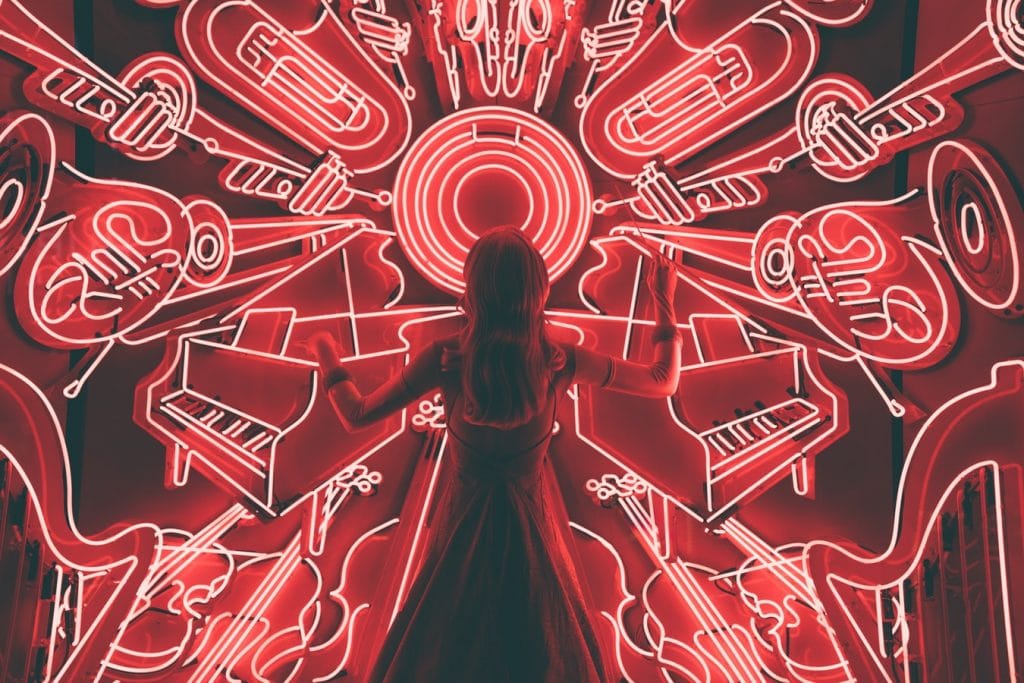Whether or not you watched I, Robot, you’re probably familiar with this famous exchange on creativity and human emotions:
Over the years, Artificial Intelligence (AI) has influenced industries from healthcare and engineering to education and automotive, and it seems that its applications are getting vaster as we speak. But when it comes to its use in creative tasks, most people agree that AI has its limitations. Despite the latest advancements in machine learning and neural programming, an AI can’t fully replicate human thinking patterns, nor create an amazing masterpiece from scratch. Even if humans tend to be skeptical of robots and automation and fear that they will take their jobs, we probably won’t be attending festivals with headlining robots, in the same way that human teachers won’t be replaced by robots and we won’t be reading books written by AI.
However, that doesn’t mean that artificial intelligence and music exclude one another. On the contrary, the applications of AI in music production have reached fascinating milestones and even though they won’t bring composers out of business anytime soon, they will help producers save time on redundant tasks and have more energy for the processes where human input is a must.
AI-powered audio mastering tools
Mastering is the final and most expensive step in music production. For indie artists, paying hundreds of dollars for an engineer’s is simply unfeasible, but now there are several AI tools that help them achieve this with just a few clicks. One such service is Landr, which uses a deep learning network to teach songs to the algorithm and help it perfect the music uploaded by producers. There’s also an AI called Master Assistant from software company iZotope, which suggests improvements to producers so that they can modify the song as they see fit. Of course, neither of the options currently available on the market is perfect because, first of all, all these platforms depend on producers to upload songs so that they can from them. Second, AI cannot currently achieve the same level of finesse as a mastering engineer. Ultimately, the input of a human expert is the most valuable, but artists who struggle financially can still use AI tools to master their music on a budget or at least get an idea of what they should improve.
Generating background music with AI
The perfect background tune can intensify the message of a video and trigger an emotional response from the viewer. In an era where we consume more video content than ever before, especially on YouTube, background music has become all the more important. Being a content creator on YouTube has turned into a lucrative job for many and since the platform’s algorithm doesn’t take kindly to using copyrighted music in the background, YouTubers have resorted to other options, including AI. For example, YouTuber Taryn Southern, who was frustrated with having to find good background music for her weekly videos, started using software to generate music for her. And the results were better than expected. Taryn was so impressed with the potential of AI in music production that in 2018 she released an album produced entirely by AI.
For small YouTubers, an AI that can understand what a video is about and suggest background music can be a major timesaver. However, there are many factors at play and there will always be cases when AI isn’t sophisticated enough to understand the nuances of human speech. As explained by the experts at MelodyLoops, for some videos that don’t fall into a clearly defined niche, it’s much more effective to browse a collection of royalty-free music yourself and choose something that perfectly hits the mark. Although the current state of AI looks really promising, it can fail to understand the target audience of a video because it can’t pick up on subtle nuances. Even YouTube’s algorithm has been known to flag some videos as being for kids because they had the word “toy” in them when in fact they were about collectible items. So, for more complex projects such as documentaries or short films, a human touch is still required.
AI as a playground for new creations
Experts estimate that in a few years up to 25% of all songs in Top 40 will be written entirely or partially by AI. This can be quite a divisive topic because some people believe this is cheating while others, like Taryn Southern, believe that we need to redefine the creative process of music-making. But even though the concept of AI in music production has only gained traction recently, the idea isn’t exactly new. About twenty years ago, David Bowie helped create the Verbasizer for Mac, a tool that randomly arranged pieces of inputted text to create new ones and give them different meanings. Although the tool wasn’t advanced enough to create the lyrics for an entire song, David Bowie explained that it helped him explore new creative dimensions and play with ideas that he wouldn’t have normally thought of. If we look at the way modern artists use AI, we’ll notice many similarities. Songs written entirely by AI often don’t make sense or sound downright ridiculous – and it’s only normal for lyrics created by a robot to lack the emotional depth and relatability of those written by a human being – but that doesn’t mean they don’t have their purpose. In time, AI can take on the more repetitive, time-consuming tasks, leaving producers more time for creative freedom. After all, AI and human producers can collaborate and maybe it is time to redefine what it means to create music.

